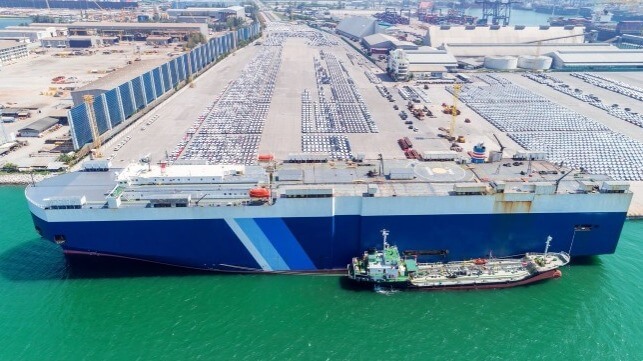Surging Chinese Car Exports Drive Up PCTC Rates

Chinese-made electric cars are flooding the European market, pushing the limits of maritime transport capacity and driving up rates for PCTCs, according to the FT.
American automaker Tesla has been grabbing most of the world's electric-car headlines, but Chinese competitor BYD has surged ahead. It sold more than three million vehicles last year, the overwhelming majority in China - but its domestic scale is powering a surge in exports. In 2023 it sold 240,000 cars for the export market.
Many of these cars - and the cars of other Chinese automakers - are headed for the European market. The FT reports that fully half of all EVs exported from China are sold in Europe, where there is substantial public appetite and government support for electric vehicles. Schmidt Automotive Research puts the China-to-Europe sales total at about 300,000 cars annually.
European CEO Michael Shu has suggested that BYD wants to sell 800,000 EVs in Europe per year by 2030, including both Chinese-built units and cars built locally. The company is building a new plant in Hungary to start producing cars within the EU, thereby gaining regulatory advantages and proximity to market.
Europe-based production would help BYD and other Chinese manufacturers (including Tesla) circumvent a growing bottleneck for their sales: ro/ro space availability. The voyage from China to Europe is one of the longest core trade lanes, and a growing demand for PCTC shipping on this route is eating up lots of car carrier capacity, according to the FT. A wave of scrapping during the pandemic - when there was a lull in car sales - has also left the market with fewer PCTCs to charter.

that matters most
Get the latest maritime news delivered to your inbox daily.
BYD is also targeting markets closer to home in Southeast Asia, challenging traditionally dominant Japanese manufacturers for market share in the region. It even plans to expand in Japan, aiming to sell 30,000 units a year in the Japanese market by 2025.
All this bodes well for car carrier operators. The volume of seaborne autoshipments likely hit a new record in 2024, according to the FT, driven largely by soaring shipments to Europe. In turn, the top car carrier companies have reported strong profitability in recent quarterly earnings reports. Market leader Wallenius Wilhelmsen has earned a steady $1.3 billion in revenue every quarter for the last year, returning $400-500 million a quarter in operating profit.
